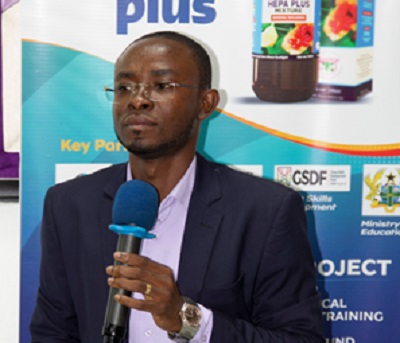Dr. Agyemang speaking at the awards launch
EBENAGE HERBAL Production and Consult (EHPC), a leading herbal medicine manufacturer in Kumasi, has launched the Hepa Plus Undergraduate Research Awards, at the Department of Herbal Medicine at the Kwame Nkrumah University of Science and Technology (KNUST), to encourage young researchers to improve on the quality of herbal medicines.
Hepa Plus is one of the medicinal products manufactured by (EHPC) along with Pavi and Plasmox, which are scientifically formulated to boost the human immune system, ensure healthy liver and promote general wellbeing.
At least, GHȼ15,000 has been committed to the commencement of the scheme for young researchers who will qualify after their proposals have been submitted. Five best students whose research proposals will be selected will be awarded accordingly.
Launching the awards, EHPC founder, Dr. Ebenezer Agyemang, a graduate of herbal medicine at KNUST, said the awards scheme was intended to encourage young researchers to come out with something innovative that will put herbal medicine on the pedestal, and to economically impact the nation.
He gave the assurance that his outfit would absorb the researchers into its manufacturing settings, mentor them and utilise their projects findings, after the completion of their studies or their projects.
The Departmental Heads of the Faculty were excited and very positive about this initiative. They commended Ebenage Herbal for providing such an important support for the department.
Later in an interview, Dr. Agyemang bemoaned the extent to which activities of illegal mining in the country are adversely affecting the herbal industry economically as well as the quality of herbal medications that are being produced.
According to him, the accumulation of heavy metals such as lead and mercury in some of the raw materials used for herbal medicines are contaminants that are so toxic to the vital organs like the kidney, liver, and lungs.
“If we do not do something about it now, we may be importing organic medicines free from contamination of some of these heavy metals, or we may be buying at higher price in the near future, because it has to go through series of processing to take out some of these heavy metals,” he warned.
While stressing that EHPC cultivates its own raw materials, Dr. Agyemang emphasised that “the issue is not limited to you being safe and secured, it is a national issue, because it is not just for the plants we are using for production but the ordinary food, the fruits, the vegetables that we use in our daily lives.”
The situation, he stated, should be regarded as a national concern, as some manufacturers are aware while others are unaware as a medicinal product ought to be analysed before the level of contamination can be established.
FROM James Quansah, Kumasi


